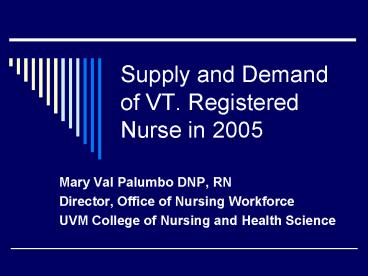Supply and Demand of VT' Registered Nurse in 2005 - PowerPoint PPT Presentation
1 / 26
Title:
Supply and Demand of VT' Registered Nurse in 2005
Description:
Survey of Vermont Registered Nurses (Supply) Board of Nursing RN Relicensure Survey 1-3/05 ... Registered Nurse Vacancy. and Turnover Across Settings. Weeks to ... – PowerPoint PPT presentation
Number of Views:24
Avg rating:3.0/5.0
Title: Supply and Demand of VT' Registered Nurse in 2005
1
Supply and Demand of VT. Registered Nurse in 2005
- Mary Val Palumbo DNP, RN
- Director, Office of Nursing Workforce
- UVM College of Nursing and Health Science
2
2005 Relicensure Survey of Vermont Registered
Nurses
- (Supply)
3
Board of Nursing RN Relicensure Survey 1-3/05
- N 5,805 (65 response rate)
- 4075 employed as RN in VT (70)
- 94 female
- 93 Caucasian
- Mean age 48 years
4
Age of RNs Working in VT
5
(No Transcript)
6
Setting of Primary Employment
7
Satisfaction with Current Position
2 - Not answered
8
Likeliness to leave position in next year
2 - Not answered
9
2005 Vermont Health Workforce
Assessment(Nursing Demand)
10
Purpose
- Funding was received from the
- HRSA Special Congressional Initiative for
Rural Health Research to - Identify healthcare workforce shortages in
Vermont.
11
Purpose
- Accurate Data
- In 2000, a national survey concluded there was
no nursing shortage in Vermont, contrary to the
consensus of Vermont nurse leaders.
12
Response Rates
13
Registered Nurse Vacancy and Turnover Across
Settings
14
Weeks to fill nursing positions
- Psychiatric nurse (24 wks)
- LTC RN evenings (21 wks)
- Hospital Nurse manager (17 wks)
- LTC RN nights (15 wks)
- ICU nurse (14 weeks)
- LTC RN days (12 wks)
- LTC Nurse Manager (12 weeks)
- Operating Room (10 wks)
- Hospital pediatric nurse (10wks)
15
Hospital Nursing PositionVacancy and Turnover
Rates
16
Home Health Nursing Positions - Vacancy and
Turnover Rates
17
Office Employee Vacancy and Turnover
18
Need assessment
- 16 of hospital nurse executives reported the
need for registered nurses was greater than the
number of budgeted positions. - (Down from 55 in 2003)
19
Recruitment Incentives
- Impact of starting salary on recruitment was
reported to adequate by 83 of hospital, 80 of
home health and 47 of LTC respondents. - Lack of differentiated salary for education (75)
- and certification (67) in of hospitals
remains troubling. In home health,
70 report paying a differential for educational
preparation.
20
Impact of Shortages
- Most commonly reported impacts of workforce
shortages in all settings - Decreased staff satisfaction
- Decreased patient satisfaction
- Increased patient complaints
21
Further Impact of Shortages on Hospitals
- Delayed or diverted admissions
- (42 several times/yr, 42 monthly)
- Reduced number of staffed beds
- (17 - monthly, 42 several times/yr.)
- Emergency room overcrowding
- (25 several times/yr, 17 weekly.)
- Delayed discharge (17 several times/yr, 8
monthly, 8 daily)
22
Vermont Conclusions
- Vermont has a nursing shortage in LTC and highly
skilled specialty areas. - Improvements have been seen in vacancy and
turnover of RN in the hospital and home health
settings over the past two years. - Consequences of the short staffing are present in
varying degrees throughout the Vermont health
care system.
23
Conclusions from
- Is the shortage of hospital RNs getting better
or worse? Findings from 2 national surveys of
RNs. Buerhaus et al (2005) Nursing Economics. - Comparing 2002 and 2004, RNs perceived an eased
shortage since 2002 and notable improvements in
work life. Longstanding problems with work
environment continue.
24
Recommendations
- Increased efforts needed for recruitment and
retention of the Registered Nurse in the LTC
setting - Continue opportunities for career mobility into
areas of psychiatric nursing, operating room,
geriatrics, pediatrics, and management.
25
Recommendations from
- Act Now For Your Tomorrow, Final Report of
National Commission on Nursing Workforce for LTC,
April 2005 - Long Term Care Leaders must
- Generate interest in their profession
- Address educational opportunities
- Create new partnerships with education
26
- Current shortfalls will only increase over the
next several decades.































